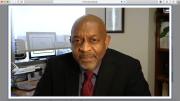Perhaps more than any other group of graduates on Thursday, the new doctors receiving their degrees from Harvard Medical School (HMS) stand at the edge of a precipice. They will enter their profession in the midst of a global pandemic, for which there is no vaccine yet, and no cure. “I think it’s safe to say that nobody expected things to be like this,” Class Day keynote speaker Robert Satcher, M.D. ’94, said from his office in Houston, addressing graduates of HMS and the Harvard School of Dental Medicine.
A NASA astronaut with a Ph.D. in chemical engineering from MIT, Satcher was the first orthopedic surgeon and the first oncologist to travel into space, during a 2009 mission to the International Space Station on the shuttle Atlantis. Now he teaches orthopedic oncology at the University of Texas MD Anderson Cancer Center. He told graduates that the need for their work has never been clearer—a note that HMS dean George Q. Daley also sounded during the ceremony. “You have dedicated your lives to a career in service to others,” Daley told the graduates. “Few times in history has this commitment held as much meaning as it does today. The COVID-19 pandemic has transformed the world, and you are the newest members of a profession that stands on the front lines of this struggle.”
Daley told how in 1918, as the influenza pandemic swept through Boston, Harvard medical students had treated hundreds of sick soldier-students in Cambridge, and he acknowledged the fear and uncertainty that today’s graduates must surely feel. As a young doctor himself, Daley said, he had felt those same emotions, in the midst of a different plague: “In the summer of 1984, I had my first clinical rotation as the AIDS epidemic raged across the country. We had only a primitive understanding of the disease, no treatments for the virus, and infection was almost inevitably fatal. I remember well the anxiety I felt starting a subclavian central line on an AIDS patient in the ICU. But I also felt the tremendous responsibility, the solemn duty to care for that patient.”
Daley invoked the graduates’ “fundamental calling” and confirmed its inherent risks and sacrifices. “Serving in times of crisis is part of the inspiration that drew us to medicine,” he said, “and no matter how much the world changes, the central calling of our profession—to heal and to help those who need our talents, training, skills, and compassion—that will never change.”
During his own speech, Satcher drew on similar themes. He recited passages from medicine’s professional pledge, rooted in the Hippocratic oath: “I do not treat a fever chart, or a cancerous growth, but a sick human being….” He quoted Malcolm X and Billy Graham on adversity, Kanye West on hope and vision, and Barack and Michelle Obama on injustice and opportunity. Comparing the emergency of COVID-19 to the near-disaster of the 1970 Apollo 13 mission, he reminded his audience how creativity, quick thinking, and calm resolve saved the three astronaut’s lives and brought them home safely after a fire damaged their spacecraft. “We have a similar opportunity today,” he said.
But Satcher also spoke plainly about the inequalities and institutional injustices laid bare by the pandemic, which has killed poor and nonwhite Americans in vastly disproportionate numbers. “The health-care system in this country, amongst many other things, is still not fair,” he said. “It is still contaminated with racism.” He recalled that his uncle, former U.S. Surgeon General David Satcher (who spoke at an HMS graduation 20 years ago), had “established ethical guidelines for informed consent in clinical research that stem from the infamous Tuskegee experiment,” in which African-American men were infected with syphilis by the federal government and left untreated. “This ongoing racial bias has been demonstrated over and over again”: heart attacks in African-Americans taken less seriously, cancer pain treated with less care, abnormally long waits in black neighborhoods’ emergency rooms. “The pandemic has accelerated the recognition of these inequities. So the only questions that remain are: number one, can we handle the truth? And, number two, what are we going to do about it?”
He closed with a remembrance about his great-grandfather, a sharecropper in Alabama with ambitions for his children to go to college. Instead, he narrowly escaped a lynching in the middle of the night and fled to Birmingham, and from there made his way, through “a combination of hitchhiking, odd jobs, and walking,” to Cleveland. In the end, none of his children attended college. But his children’s children did—and not only college, but graduate school. “So, if my great-grandfather could persevere and see his legacy realized in the face of such overwhelming adversity, I, you, and we certainly can do the same or perhaps better.…I implore you to be bold and have a vision that isn't clouded by cynicism or fear. You can remake our health-care system and remake the world.”









